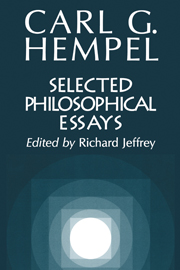METHODOLOGY
Published online by Cambridge University Press: 05 June 2012
Summary
9 [3] “Analyse logique de la psychologie,” Revue de Synthese 10 (1935), 27–42. Wilfrid Sellars's translation, “The Logical Analysis of Psychology,” appeared in Herbert Feigl and Wilfrid Sellars, eds., Readings in Philosophical Analysis (New York: Appleton-Century-Crofts, 1949), pp. 373–84.
10 [92] “Schlick und Neurath: Fundierung vs. Köharenz in der wissenschaftlichen Erkenntnis,” Grazer philosophische Studien, vol. 16/17 (1983), 1–18; Christian Piller, trans., “Schlick and Neurath: Foundation vs. Coherence in Scientific Knowledge.”
11 [102] “On the Cognitive Status and the Rationale of Scientific Methodology,” Poetics Today 9 (1988), 5–27. Hempel notes that Part I is an annotated and slightly revised version of [95] and that Part II contains passages from [97].
12 [100] “Provisoes: A Problem Concerning the Inferential Function of Scientific Theories,” in Adolf Grunbaum and Wesley Salmon, eds., The Limitations of Deductivism (Berkeley: University of California Press, 1988), pp. 19–36. Also in Erkenntnis 28 (1988), 147–64.
Essay 9 is a period piece from the early heyday of physicalism, when it could seem plausible both that any meaningful statement must be translatable into a sentence in the language of physics and that the possibility of such translation is a purely logical matter. In it, Hempel's proposed dissolution of the mind-body problem was a version of the identity theory according to which it is a matter of logic that “Otto has a toothache” will be equipol-lent to some physical sentence. Which physical sentence? The answer is an empirical matter.
- Type
- Chapter
- Information
- Selected Philosophical Essays , pp. 163 - 164Publisher: Cambridge University PressPrint publication year: 2000



